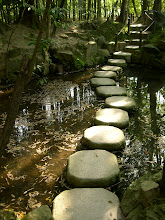 A Mainichi Daily News article suggested that Japan's Environment Ministry is concerned that a bio-toilet recently placed on the seventh stage of Mt. Fuji's Yoshida route is in danger of overflowing due to overuse.
A Mainichi Daily News article suggested that Japan's Environment Ministry is concerned that a bio-toilet recently placed on the seventh stage of Mt. Fuji's Yoshida route is in danger of overflowing due to overuse.Thousands upon thousands of visitors to Japan's most "sacred" mountain are sending hopes of attaining World Heritage Site status down the crapper. . .literally.
I have to agree with a recent argument made by D.P. Martinez in a book chapter entitled, "On the 'Nature' of Japanese Culture, or, Is There a Japanese Sense of Nature?", where he suggests that what is often taken as a unique Japanese sense of nature stems largely from a history of elite aestheticism in which the natural was packaged for human consumption. In other words, cultural representations of nature, such as gardens or bonsai trees, should not lead us to assume a unique respect of nature on the part of Japanese.
Mt. Fuji represents this seeming contradiction well. . .a natural symbol of Japan that is yearly degraded by a string of tourists who leave behind human waste and garbage. This is not to say there is no respect for nature in Japan, but it is not homogeneous and inherent. Also, I would argue that the dissemination of discourses on nature from metropolitan areas less a response to the natural world and has more to do with insecurities about Japan's modernity. The portion of Japan's population living in rural areas have to deal with the realities of nature and their discourses reflect this.
-Martinez, D.P. 2008. On the "Nature" of Japanese Culture, or, Is There a Japanese Sense of Nature? in A Companion to the Anthropology of Japan. J. Robertson, ed. Oxford: Blackwell.






No comments:
Post a Comment